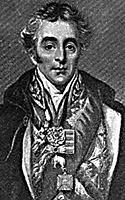In 1226 a Wellesley went to Dublin, on the King's business, and purchased some property. After the fourteenth century the family seems to have lived in Ireland gradually building up their holdings by marriage or service. In the reign of Charles I the family property was confiscated, religious differences between King and Valerian Wellesley being the possible cause. Valerian's successor, Gerald, changed the family name to 'Wesley', and his first name to 'Garret', which is the Irish form of Gerald. He was also successful in getting the lands back from Charles II. His son also called Garret Wesley II was not so successful in producing an heir, so he chose his first cousin Richard Colley. This was to be Wellington's grandfather.
Richard Colley was nearly forty in 1728 when he inherited the property, that same year he changed his name to 'Wesley' by adoption. In 1746 he changed the name again to 'Mornington' by ennoblement when he was created a Lord. By 1781 the title had been inherited by Wellington's elder brother Richard. This brilliant but flawed man was moving up in the world and in his campagn to be created a Marquis had changed the family name yet again. They were back to 'Wellesley', the extra letters being seen as useful ammunition in the world of heraldry. Arthur's feelings at having to change his name are unrecorded as far as I know. There is a letter dated 19 May 1798 signed 'Arthur Wellesley' addressed to General Harris in Madras announcing that 'the Right Honourable the governor-general, the Earl of Mornington had arrived in Calcutta'.
From Wellesley to Wellington
Clearly the three extra letters had been of benefit. So in 1809 when he fought and won the battle of Talavera his name was 'Wellesley'.
The King and Prime Minister decided to enhance the victory by confirming a peerage on our hero, but for the uproar over the Convention of Cintra this reward would probably have been awarded after his success at Vimeiro. He was to become a Viscount, the first rung on a ladder of titles and honours that would take him to the top of the peerage as a Duke. A name was needed to go with the tittle. Arthur's younger brother William was pressurised by the College of Heralds, they would not allow time for the recipient of the honour to be consulted. In a letter dated 22 August 1809 William jokingly chided his brother for not leaving him instructions for such an eventuality. Arthur was not one to count his chickens before they were hatched. William went on to explain how he picked the name 'Wellington,' 'after ransacking the Peerage and examining the map, I at last determined upon Viscount Wellington of Talavera, and Baron Douro of Welleslie in the county of Somerset - Wellington is a town not far from Welleslie...I trust that you will not think there is anything unpleasant or trifling in the name Wellington...'
Well we wouldn't would we. Neither did Arthur, he replied,
'Viscount Wellington of Talavera is exactly right. You could not take for me Lord Wellesley's title...you were quite right in not taking Vimeira: and in that situation you have chosen most fortunately.'
Wife Wellington
However Arthur's wife Kitty had other ideas, back home in Broadstairs she wrote in her diary for August 26th:
'Lord Henniker called in this evening to congratulate me in Sir Arthur's Peerage. I regret his former stile and title - that of Wellington I do not like for it recalls nothing. However, it is done & I suppose it could not be avoided'
Which just goes to show that you cannot please everyone.
Wellington, as we may now properly call him, used his title for the first time in a letter to John Villiers about finance on September 4th:
'Believe me, etc., This is the first time I have signed my new name. Would the [Portuguese] Regency give me leave to have a chasse [Hunt] at Villa Vicosa.'
Which I think shows what he was more interested in.
Most of the information for this article has come from Elizabeth Longford's excellent book 'Wellington, The Years of the Sword,' which is a mine of information on Wellington, both his private life and campaigns. A book I heartily recommend for anyone interested in the man.
Related Article:
This article appears in MagWeb (Magazine Web) on the Internet World Wide Web. It is a surprising fact that the Duke of Wellington did not have a hand in choosing the name we all know him by. It was more by chance than any decision by himself that Wellington was chosen. Arthur, the future Duke of Wellington, was born on 1st of May 1769 in Dublin and at that stage the family name was 'Wesley'. The name had gone through various changes before that date, the earliest reference to the family is in Somerset on a charter dated 1180 which is in the archives of Wells Cathedral where it is spelt 'Wellesley'. A Wellesley may have accompanied Henry II on his invasion of Ireland in the 1170s as his Standard Bearer.
It is a surprising fact that the Duke of Wellington did not have a hand in choosing the name we all know him by. It was more by chance than any decision by himself that Wellington was chosen. Arthur, the future Duke of Wellington, was born on 1st of May 1769 in Dublin and at that stage the family name was 'Wesley'. The name had gone through various changes before that date, the earliest reference to the family is in Somerset on a charter dated 1180 which is in the archives of Wells Cathedral where it is spelt 'Wellesley'. A Wellesley may have accompanied Henry II on his invasion of Ireland in the 1170s as his Standard Bearer.
Wellington.
Back to Table of Contents -- First Empire #28
© Copyright 1996 by First Empire.
Other military history articles and gaming articles are available at http://www.magweb.com